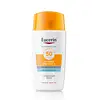What's inside
What's inside
 Key Ingredients
Key Ingredients

 Benefits
Benefits

 Concerns
Concerns

 Ingredients Side-by-side
Ingredients Side-by-side

Water
Skin ConditioningAlcohol Denat.
AntimicrobialC12-15 Alkyl Benzoate
AntimicrobialButyl Methoxydibenzoylmethane
UV AbsorberBis-Ethylhexyloxyphenol Methoxyphenyl Triazine
Skin ConditioningEthylhexyl Triazone
UV AbsorberButylene Glycol Dicaprylate/Dicaprate
EmollientDibutyl Adipate
EmollientDiethylamino Hydroxybenzoyl Hexyl Benzoate
UV FilterPhenylbenzimidazole Sulfonic Acid
UV AbsorberSilica
AbrasiveTapioca Starch
Polyglyceryl-6 Stearate
EmollientSilica Dimethyl Silylate
EmollientGlycerin
HumectantGlycyrrhiza Inflata Root Extract
Skin ConditioningSodium Hyaluronate
HumectantArginine Hcl
Skin ConditioningSodium PCA
HumectantSodium Lactate
BufferingGlycyrrhetinic Acid
Skin ConditioningCetearyl Alcohol
EmollientGlyceryl Stearate
EmollientCopernicia Cerifera Cera
EmollientPolyglyceryl-6 Behenate
Emulsion StabilisingXanthan Gum
EmulsifyingHydroxypropyl Methylcellulose
Emulsion StabilisingSodium Hydroxide
BufferingTrisodium EDTA
Hydroxyacetophenone
AntioxidantPhenoxyethanol
PreservativeParfum
MaskingWater, Alcohol Denat., C12-15 Alkyl Benzoate, Butyl Methoxydibenzoylmethane, Bis-Ethylhexyloxyphenol Methoxyphenyl Triazine, Ethylhexyl Triazone, Butylene Glycol Dicaprylate/Dicaprate, Dibutyl Adipate, Diethylamino Hydroxybenzoyl Hexyl Benzoate, Phenylbenzimidazole Sulfonic Acid, Silica, Tapioca Starch, Polyglyceryl-6 Stearate, Silica Dimethyl Silylate, Glycerin, Glycyrrhiza Inflata Root Extract, Sodium Hyaluronate, Arginine Hcl, Sodium PCA, Sodium Lactate, Glycyrrhetinic Acid, Cetearyl Alcohol, Glyceryl Stearate, Copernicia Cerifera Cera, Polyglyceryl-6 Behenate, Xanthan Gum, Hydroxypropyl Methylcellulose, Sodium Hydroxide, Trisodium EDTA, Hydroxyacetophenone, Phenoxyethanol, Parfum
 Reviews
Reviews

Ingredients Explained
These ingredients are found in both products.
Ingredients higher up in an ingredient list are typically present in a larger amount.
You might know this ingredient as Tinosorb S or Bemotrizinol. It is a UV filter that covers both UVA and UVB rays.
This ingredient has two peak UV absorption peaks ( 310 and 340 nm) and is able to absorb both UV-A and UV-B rays. This ingredient works by preventing UV rays from reaching and damaging your skin.
On top of that - it is highly photostable and helps prevent the photodegration of other sunscreen ingredients such as avobenzone.
Tinosorb S is allowed in the EU, Australia, and Asia. It is close to being approved by the FDA and we'll hopefully get this ingredient in the U.S. by late 2025.
Fun fact: Tinosorb S is the most effective UV absorber at maximum concentration (measured by SPF) permitted in the EU.
This ingredient is oil-soluble, so your oil-cleansers will take this right off at night.
Learn more about Bis-Ethylhexyloxyphenol Methoxyphenyl TriazineAlso known as Avobenzone, this ingredient is a chemical sunscreen filter that provides protection in the UV-A range.
Avobenzone is globally approved and is the most commonly used UV-A filter in the world.
Studies have found that avobenzone becomes ineffective when exposed to UV light (it is not photostable; meaning that it breaks down in sunlight). Because of this, formulations that include avobenzone will usually contain stabilizers such as octocrylene.
However, some modern formulations (looking at you, EU!) are able to stabilize avobenzone by coating the molecules.
Avobenzone does not protect against the UV-B range, so it's important to check that the sunscreen you're using contains other UV filters that do!
The highest concentration of avobenzone permitted is 3% in the US, and 5% in the EU.
Learn more about Butyl MethoxydibenzoylmethaneEthylhexyl Triazone is a modern chemical sunscreen that protects from UV-B radiation.
It is the most effective of existing UV-B filters, as it provides the highest level of photo-stable absorption. It protects from the entire UV-B range (280 to 320nm), with it's highest level of protection at 314nm.
Ethylhexyl Triazone is oil soluble, oderless and colorless, which mean it is able to be incorporated into a variety of different formulations.
It is not currently available within the United States due to slow changing FDA regulations. Outside of the US, it is used in formulations at concentrations up to 5%.
Learn more about Ethylhexyl TriazonePhenoxyethanol is a preservative that has germicide, antimicrobial, and aromatic properties. Studies show that phenoxyethanol can prevent microbial growth. By itself, it has a scent that is similar to that of a rose.
It's often used in formulations along with Caprylyl Glycol to preserve the shelf life of products.